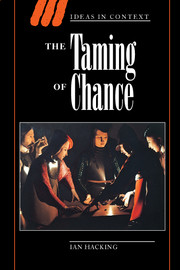Book contents
- Frontmatter
- Contents
- Acknowledgements
- 1 The argument
- 2 The doctrine of necessity
- 3 Public amateurs, secret bureaucrats
- 4 Bureaux
- 5 The sweet despotism of reason
- 6 The quantum of sickness
- 7 The granary of science
- 8 Suicide is a kind of madness
- 9 The experimental basis of the philosophy of legislation
- 10 Facts without authenticity, without detail, without control, and without value
- 11 By what majority?
- 12 The law of large numbers
- 13 Regimental chests
- 14 Society prepares the crimes
- 15 The astronomical conception of society
- 16 The mineralogical conception of society
- 17 The most ancient nobility
- 18 Cassirer's thesis
- 19 The normal state
- 20 As real as cosmic forces
- 21 The autonomy of statistical law
- 22 A chapter from Prussian statistics
- 23 A universe of chance
- Notes
- Index
- Ideas in Context
19 - The normal state
Published online by Cambridge University Press: 05 June 2014
- Frontmatter
- Contents
- Acknowledgements
- 1 The argument
- 2 The doctrine of necessity
- 3 Public amateurs, secret bureaucrats
- 4 Bureaux
- 5 The sweet despotism of reason
- 6 The quantum of sickness
- 7 The granary of science
- 8 Suicide is a kind of madness
- 9 The experimental basis of the philosophy of legislation
- 10 Facts without authenticity, without detail, without control, and without value
- 11 By what majority?
- 12 The law of large numbers
- 13 Regimental chests
- 14 Society prepares the crimes
- 15 The astronomical conception of society
- 16 The mineralogical conception of society
- 17 The most ancient nobility
- 18 Cassirer's thesis
- 19 The normal state
- 20 As real as cosmic forces
- 21 The autonomy of statistical law
- 22 A chapter from Prussian statistics
- 23 A universe of chance
- Notes
- Index
- Ideas in Context
Summary
Until Broussais, the pathological state obeyed laws completely different from those governing the normal state, so that observation of one could decide nothing for the other. Broussais established that the phenomena of disease are of essentially the same kind as those of health, from which they differed only in intensity.
The collective organism, because of its greater degree of complexity, is liable to problems more serious, varied and frequent than those of the individual organism. I do not hesitate to state that Broussais's principle must be extended in that direction, and I have often applied it there to confirm or perfect sociological laws. But those who would apply the analysis of Revolutions to the Positive study of Society must pass through the logical training given by the simpler phenomena of Biology.
Normality is like determinism, both timeless and dated, an idea that in some sense has been with us always, but which can in a moment adopt a completely new form of life. As a word, ‘determinism’ came into use in the 1780s, and assumed its present most common meaning in the 1850s. As a word, ‘normal’ is much older, but it acquired its present most common meaning only in the 1820s. Now although the two words are conspirators in the taming of chance, they enter in very different ways. The normal was one of a pair. Its opposite was the pathological and for a short time its domain was chiefly medical. Then it moved into the sphere of — almost everything.
- Type
- Chapter
- Information
- The Taming of Chance , pp. 160 - 169Publisher: Cambridge University PressPrint publication year: 1990
- 2
- Cited by

